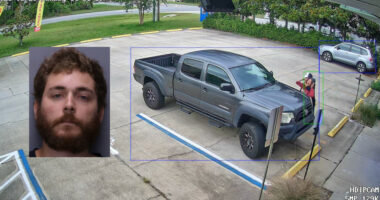
Appearing before the Flagler County Commission on Monday, numerous current and former volunteers at the Flagler Humane Society, including a former board member, spoke critically, sometimes bitterly, of an organization beyond its capacity to care for a growing number of animals, a governing structure too lax with policies and procedures, unaudited books, unjustified euthanasias, and a climate of retribution that led to the discharge of three volunteers who spoke out about the recent euthanizing of Guapo, a pit bull mix.
“Maybe this is an issue that we as a county take over running that place and that might be the answer, because then we’d have control,” County Commissioner Greg Hansen said. “These are alarming statistics. I’ve inspected it once. They knew I was coming. So I don’t know if that was a real good inspection. But everything looked great. There were no big barking dogs, and everything looked nice. But like I said, they knew I was coming. Maybe it’s time to change, make big change here.”
Fellow-commissioners were especially concerned about what they perceive to be a lack of accountability for the tax dollars going to the society.
The county appropriated $284,000 to the society this year. It is set to appropriate $304,000 for the coming year.
For the 2022 tax year, the last year for which a filing is available, the Humane Society recorded total revenue of $4.3 million, an enormous jump from 2020, when revenue was $1.5 million. In 2022, revenues include $1.9 million from program services run by the society and $1 million from grants and contributions. Pay for Amy Carotenuto, the society’s director, was reported as $57,777, with total salaries and wages for all society employees reported to be $1.26 million. The society reports paying $305,000 for “occupancy.” It had total expenses of $3.9 million.
“There’s no financial audit. What’s on there are federal tax returns, which doesn’t tell you anything,” Commissioner Donald O’Brien said. “This organization has well over a million dollars in revenue or money flowing into it. So I don’t know what the requirements are for a nonprofit and what our oversight should be, but I don’t think it’s enough, with with the growth that we’ve had in the county over the last five years.”
Commissioner Leann Pennington said the facility is running out of space, and is not fulfilling its responsibilities with animal control. “I don’t think we’re the only government officials having issues with animal control, and I know that one of the animal control agents that we swore in has left because of issues,” Pennington said. “We’re not getting the services we are expecting the residents to receive. And on top of it, as they talked about, animals are not necessarily getting the care we would expect them to receive.”
The portrait of the society former and current volunteers painted was alarming, but it was one-sided: there were no society representatives there.
“Nobody seems to know what one person is doing there,” Kathy Sarris, a recently discharged volunteer, said. “The reason I was terminated, and the others, was because we commented on Guapo’s euthanasia, which was an unnecessary killing, along with the other 79 dogs that they honestly reported last year, and the almost 60 cats. What they need to do instead of euthanizing these animals is give them half a chance.”
“All animals, whether sick, injured or aggressive, being surrendered, along with residents and families visiting the shelter, all enter and exit through the same doorway into a crowded reception area,” Wendy Trimarche told the commission. Trimarche is a longtime board member and volunteer with the Indian River County and Vero Beach Humane Society who recently moved to Flagler County and started volunteering at the Flagler County Humane Society. Red flags accumulated the moment she started going to the building at 1 Shelter Drive, off of U.S. 1.
“Cats in hallways, living in hallways, dogs living in crates on the floor,” she said. What she saw was a facility exceeding its capacity, with no strategic plan for the future. She claimed the society has some 50 staff members with no accredited human resources person there (the website’s staff page lists nearly 50 people). The board of directors is always in flux, she said, veterinary standards are lax, finances are not audited beyond a federal tax return posted on the website. Trimarche recommended regular audits and the development of a strategic plan.
The euthanizing of Guapo was spoken of repeatedly by the people addressing the commission. “There were many others in my two years as a volunteer also euthanized, many of them healthy,” one volunteer said. “It is heartbreaking losing a pet, but when it’s a healthy dog, it’s even harder. Where’s the accountability for Flagler Humane Society? They have no protocol in euthanizing pets.” She spoke of lacking standards–lack of drinking water for dogs, no daily walks, understaffed kennels, lacking leadership.
According to its 2023 report, the society took in 2,479 animals that year (942 dogs, 1,537 cats), all but a few adopted out or returned to their owners. Thirty animals died in the society’s care, and 145 animals were euthanized, two of them at the others’ request.
Anne Thompson, yet another volunteer–she started volunteering in January–had recently retired from owning a doggy daycare and boarding facility for 15 years, where she took care of 80 to 100 dogs daily. Her offer of help with free home visits and follow-up calls to help animals de-stress from kennel stays was turned down, which prompted her to speak out. She referred to what she considered an unnecessary euthanasia of Guapo based on what she considered subjective judgments. ” Before euthanasia, there needs to be thorough testing. It is not a decision for one person alone,” Thompson said. ” I know you can do better for these dogs, especially as the human population is increasing. Dogs, too, are family members.”
A former society board member said he resigned in 2023 “primarily because I found it to be an organization that was totally resistant to positive change. I was asked to come to a meeting of some of the current volunteers a week ago, and was very disappointed to learn that many of the problems that existed when I left the board 15 months ago exist today.” He described the consequences of a maxed-out shelter suffering from “explosive growth,” and said either an additional shelter or other rescue organizations must be considered in addition to the society, to relieve the pressure. Yet another volunteer described a reigning indifference to procedures, lacking policies and poor communication from staff.
“I experienced an irate staff person yelling at dogs as well as other volunteers,” the resident said. “Another staff person told me herself that the dogs are all quiet in the morning when she comes in, and she finds it funny to yell loudly and wake them all up, causing more anxiety.” She added: “Flagler Humane Society is not a no-kill shelter. I believe Flagler County can do a better job of assuring pets are not neglected at a local shelter.”
County Administrator Heidi Petito said her administration could meet with the society. But the county’s authority is limited. “They are a nonprofit with their own board, so we don’t technically have oversight,” Petito said. “Even though they share the name Flagler County, people assume we have something to do with it.”
Commission Chair Andy Dance wants to see a closer examination of the operation, and a chance for the society to speak for itself: “From the oversight standpoint, I agree with the comments that based on our contributions, that seems to be that some of the oversight for us to make sure that our taxpayer funds are being spent wisely and appropriately are maybe a little lacking.” He suggested a workshop to hear from the society’s side.
“I think it’s a bigger problem in this is just a piece of it,” Pennington said.






